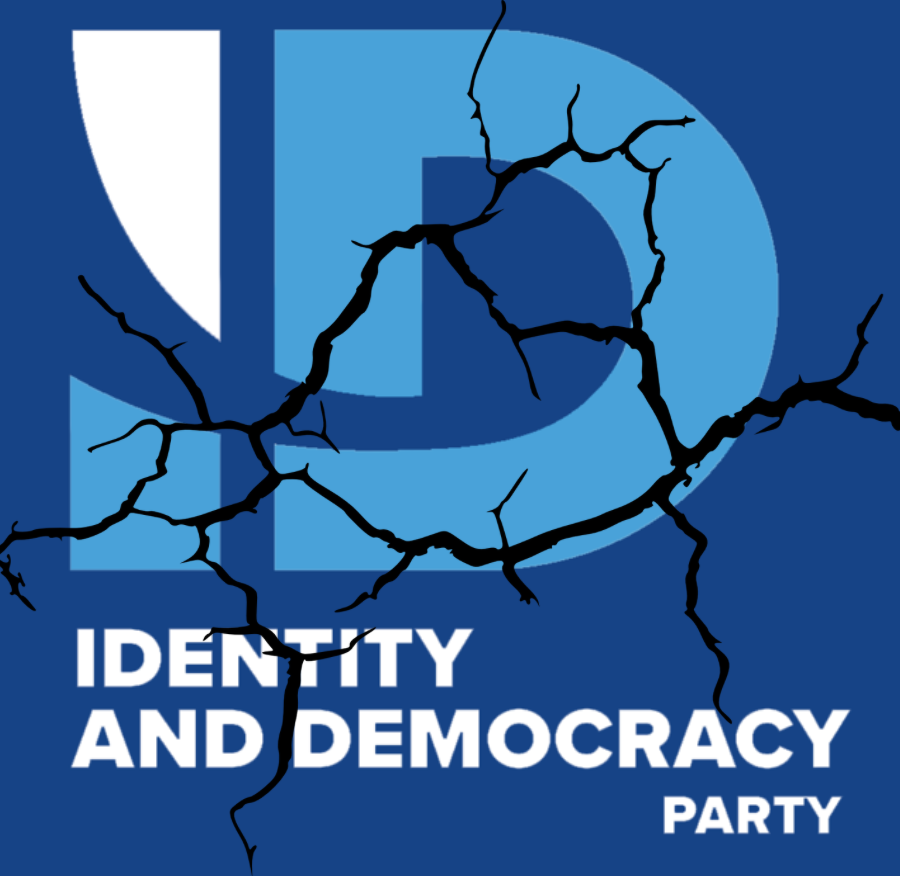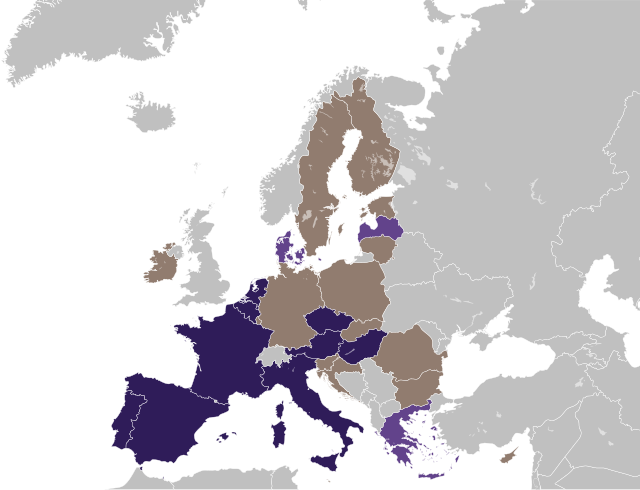❦
From the labyrinthine corridors of the European Parliament in Brussels, an earthquake has sent tremors across the continent. The Identity and Democracy (ID) group, once a formidable and quickly growing bloc of far-right parties united in their dismay with continental integration and mounting immigration, has ruptured. This seismic shift in the European political landscape comes in the wake of the 2024 European Parliament elections, a contest that saw both triumphs and setbacks for Europe’s crescent nationalist right. As dust settles on the battlefield months later, observers find themselves pondering the far-reaching implications of this schism: from the grand halls of Brussels to the small squares of rural towns, the tremors of change can be felt.

The Rise and Fall of a Populist Alliance
At its formation in 2019, the Identity and Democracy (ID) group wove together some of Europe’s most prominent far-right parties. Among its ranks: Marine Le Pen’s Rassemblement National (RN) from France, Matteo Salvini’s Lega from Italy, and Germany’s Alternative für Deutschland (AfD). Their shared platform—opposition to further European integration, skepticism towards immigration, and focus on the promotion of national sovereignty—has since its inception resonated with a significant portion of the European electorate.
At its height, the ID group had secured 76 seats in the ninth European Parliament (2019–2024), capitalizing on a wave of populist and anti-establishment sentiment sweeping across Europe following the culminations of the refugee crisis and the Eurozone financial turmoil. For a brief period, the ID group seemed poised to reshape the future of Europe, with its anti-immigration rhetoric and calls for national sovereignty garnering ever-increasing sympathy.
However, the 2024 European Parliament elections proved to be a crucible for the group, exposing deep fissures within its ranks. While Le Pen’s RN saw a surge in support—polling at 31 percent—Salvini’s Lega suffered a dramatic decline in Italy, with its voter base plummeting from 34 percent to a mere nine percent. This drop was attributed to the rise of Giorgia Meloni’s Fratelli d’Italia (FDI), which, as a more moderate alternative, has successfully positioned itself as the dominant right-wing force in Italy.
The Catalyst: A Clash of Visions and Ambitions
Perhaps the first factor behind the ID group’s recent unraveling to show its teeth was a growing divergence in its members’ views on relations with Russia, particularly after the 2022 invasion of Ukraine. While RN and Lega became increasingly cautious in their rhetoric regarding Moscow, fearing electoral backlash for appearing sympathetic to Russia, the AfD remained staunchly pro-Russian. This created a rift within the group as public opinion in Europe hardened against the Kremlin following the war and subsequent energy crisis.
Marine Le Pen herself had to walk a fine line. Although she had previously been supportive of closer ties with Moscow, she stated in 2024,We owe our respect and support to the Ukrainian nation, which has endured aggression.” This marked a significant shift in RN’s stance, with Le Pen distancing herself from her previous pro-Russian policies.
The final blow to the ID group came when leading AfD MEP Maximilian Krah made controversial remarks, downplaying the crimes of Nazi SS members during an interview with an Italian newspaper. This caused a political firestorm, with Le Pen publicly condemning the remarks, declaring that AfD has fallen under the sway of its most radical fringe [and] no longer seems to come to be a reliable and suitable ally.” The AfD, already embroiled in multiple scandals involving alleged espionage and ties to pro-Russian and pro-Chinese propaganda, proved to other aligned parties to be too much of a liability for the group. In May 2024, the ID group leadership voted to expel the AfD, signaling the beginning of the end for the alliance.
The Aftermath: Reordering the European Right
The collapse of the ID group led to a period of intense realignment within Europe’s far-right landscape.
On 30 June 2024, the founding of a new group, “Patriots for Europe,” was announced at a press conference in Vienna by representatives of Hungarian Fidesz, Czech ANO 2011, and Austrian Freiheitliche Partei Österreich (FPÖ), including Hungarian Prime Minister Viktor Orbán, former Czech Prime Minister Andrej Babiš, and former Austrian Minister of the Interior Herbert Kikcl. In rapid succession, Portugal’s Chega, Spain’s Vox, the Netherlands’ Partij voor Vrijheid (PVV), Denmark’s Dansk Folkeparti (DF), and Belgium’s Vlaams Belang announced accession to the. Later on, France’s RN under Jordan Bardella and Italy’s Lega joined forces with the new After. meeting the criteria for qualification for membership in the European Parliament on July 6th, Jordan Bardella was announced as the new group’s leader two days later.

After initially having sought to rejoin the ID group, Germany’s AfD joined hands with a number of significantly smaller parties from across the EU to form the Europe of Sovereign Nations, including France’s Reconquête and Bulgaria’s Vazrazhdane party.
Despite their split, AfD co-leader Alice Weidel suggested that the AfD expects reconciliation. “Of course I hope for a dialogue in the medium-to-long term. But I think in the short term we’ll leave it as it is. For now, I wish the RN luck”.
This realignment will likely come with its challenges for the burgeoning AfD, as it seeks legitimacy on the continental scale.
National Reverberations: A Tale of Two Trajectories
The collapse of the ID group had profound repercussions at the national level. In France, RN seemed to capitalize on the disarray by consolidating its position as the primary voice of opposition to the European establishment. Le Pen’s strategic distancing from AfD and other controversial figures allows her to promote a cleaner image—following her ‘de-demonization’ strategy years in the making—particularly in comparison to her more extreme counterparts in Germany. As a result, RN continued to gain traction in national polls, positioning Le Pen for another strong presidential run in 2027.
In Italy, however, the picture was far less optimistic for Salvini’s Lega. The party, once synonymous with Italy’s populist surge, has in recent years faced existential questions about its future. Salvini’s decision to distance himself from the pro-Russian factions of his party left him vulnerable to internal criticism, and his failure to unite the Italian right-wing under his leadership further weakened his standing. Giorgia Meloni’s rise to prominence only exacerbated these issues, as her Fratelli d’Ialia successfully absorbed much of Lega’s former voter base. By the summer of 2024, Lega was polling in single digits, prompting calls for Salvini’s stepping down as party leader in the near future.
Local Dynamics: Grassroots Impact
At the grassroots level, the collapse of the ID group led to political shifts in regions where far-right parties had gained significant support. In Germany, particularly in states like Baden-Württemberg and Hamburg, the AfD’s internal divisions and scandals have weakened its position, leading to disappointing polling for upcoming regional elections, even after major wins, notably in Thuringia. Aggregate polling for the 2025 election suggests that AfD has experienced a four-percent decline since the beginning of the year. Local AfD politicians, who had previously benefited from the party’s populist rhetoric, found themselves struggling to maintain voter loyalty as the party’s national scandals overshadowed local concerns.
While in national elections Lega faces rapidly plummeting support, it maintains relatively strong showings in many of Italy’s regional elections, having won plurality in the 2023 elections in Lombardy, Friuli-Venezia Giulia, and Trentino on behalf of the center-right coalition. However, in the critical election of Piedmont, the decline of Lega since the last election in 2019, where it won 17 seats of the vote, is evident—now with only four.
Looking Ahead: The Future of European Populism
The disintegration of the ID group raises key questions about the future trajectory of far-right populism in Europe. Some analysts interpret the collapse of the ID group as a signal of the incompatibility of national iterations of the European far right, while others warn against drawing hasty conclusions. Jan-Werner Müller, a politics professor at Princeton University, speculates that the unholy alliance of the likes of Le Pen’s RN and Hungary’s Fidesz is, given their quintessentially divergent approaches to the Ukraine-Russia question, a recipe for disaster. . He posits, however, that far-right movements across Europe have demonstrated a remarkable ability to adapt and reconfigure themselves, particularly by strategically aligning with center-right parties—following what Dutch Scholar Cas Mudde calls’mainstreaming of the far right‘.
Ultimately, the issues that have always fuelled the rise of the ID group—namely immigration, Euroskepticism, and concerns over national sovereignty—remain potent electoral drivers across Europe. The war in Ukraine and the resulting energy crisis have further polarized the political landscape. With populist parties continuing to find support among voters dissatisfied with the EU’s handling of these crises.
Conclusion: An Uncertain Horizon
The rise and fall of the Identity and Democracy group demonstrates the volatility of far-right politics in Europe. While the ID group made significant electoral gains in its early years, the inherent contradictions within its membership, combined with shifting geopolitical realities, ultimately led to its dissolution. However, the collapse of the ID group certainly does not spell the end of far-right populism in Europe. With new political realignments already underway and nationalist sentiments remaining strong, the future of populism in Europe will doubtlessly take on new forms in the years to come.


